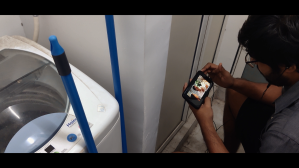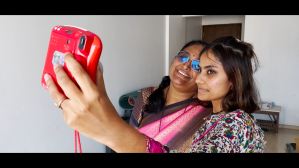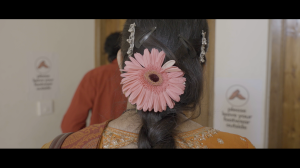[Part of Curator’s Corner, a section dedicated to showcasing work of emerging and marginal filmmakers. See here for details.]
Ever since the Sunday in 1895 when Louis Lumière photographed workers streaming out of the gates of his factory in Lyon-Monplaisir, the history of cinema has been tied up with issues of labour, leisure and workplace surveillance. In the century that followed, the image-making tools sometimes made it to the hands of the workers themselves, or to those of sympathetic filmmakers speaking on their behalf, throwing open questions around representation, ethics and consent. Who wields the camera? Who is the subject? Who holds sway over whom? Can an employee, especially dependent on the next paycheque, ever withhold permission to be filmed? Is consent paramount when filming people bound by lopsided contracts?
These questions all surface vividly in Renu Savant’s compelling new documentary The Orchard and the Pardes (Bageecha aur Pardes, 2024). An alumna of the Film and Television Institute of India, Savant is a Mumbai-based independent artist with an acute awareness of the complications of her practice and positionality. Her most prominent undertaking is the four-hour-long feature Many Months in Mirya (2017), shot in her ancestral village in coastal Maharashtra in Western India. A warm and unassuming pastoral diary film, Many Months in Mirya surveys not just the social fabric and the rhythm of life in this heterogenous village, but also the visual and aural experience of living in the place, in addition to its history, politics and ecology. Interweaving microscopic details and macroscopic events, it crafts a cinema of the land, demonstrating that a work of art can limit itself to a few square kilometres and still discover the world underneath.
The Orchard and the Pardes is set in a private mango orchard outside the town of Ratnagiri, one of the epicentres of mango production in the country, not far from Mirya. It follows the everyday activities of immigrant workers who come down to Ratnagiri from Nepal every year during the harvest season. We see the workers gathering the fruits, pruning trees and carrying out whatever tasks their Marathi-speaking employer assigns them. To get through their arduous days under a beating sun, they drink locally brewed liquor, talk over the phone or sing songs. It is the summer of 2021 and the pandemic is posing a threat to both the men’s livelihood and their timely return home.
Discussing what The Orchard and the Pardes is about risks reducing it to an issue-based documentary. Savant’s film is instead animated by the spaces in between people, each shot a record of the shifting dynamics of trust, power and language between the filmmaker, the workers and their employer. An opening intertitle clarifies the social position of the filmmaker: “The film is a document of the conditions of migrant labour in Konkan, Maharashtra, India. The film is also about the encounter between an urban woman filmmaker from the dominant caste and rural, Bahujan caste men from a male-dominated, agro-business field.”
As a lone woman engaging with an all-male environment, Savant finds herself in a complex power equation with the people she is filming. For the workers, she appears first as an emissary of their employer, and the camera a surveillance device. Their natural distrust of her presence leads them to perform for the camera, on the one hand, and take refuge in their native Nepali tongue, on the other. Throughout, we see them saying one thing to Savant in Hindi and adding something else among themselves in Nepali, despite their awareness that everything they utter could be translated. These quips, often teasing the filmmaker and sometimes of a lewd nature, are subtitled post-facto for us, but Savant herself doesn’t fully understand what is being said during the shoot.
At the same time, a sexual tension permeates the air, with these anxious bachelors sizing up the filmmaker, wondering what a single woman is doing in their midst. The threat becomes palpable in one particular sequence, in which Savant’s reticent camera records the group of men drinking during their break. With alcohol lowering the workers’ inhibitions, the camera turns into a kind of protective shield for the filmmaker, now comparably vulnerable and out of place as the workers are in Ratnagiri.
For the employer, whom we don’t see as much as the workers, the filmmaker is a potential embarrassment, someone who could record unflattering things that the labourers have to say about him or the unfair working routine he is putting them through. He is withdrawn, but his power is felt in the instructions he gives and in the workers’ testimonies of how ruthless and money-minded he is. We also sense that he has the capacity to evict the filmmaker were things to go out of control.
This three-way tug-of-war between the workers, their employer, and the filmmaker is embodied perfectly in a shot in which the camera gazes up at one of the men on a tree trying to cut down a branch. It is a dangerous job that the worker, speaking into a lapel mic, is reluctant to do despite the boss’ insistence. As he unwillingly completes the task, barely avoiding a major mishap, the filmmaker records the scene perched next to the employer. In this particular instance, the three stakeholders seem to have expectations that are orthogonal to each other. Standing shoulder to shoulder with the employer, the camera monitors the worker, while also potentially incriminating the employer for the hazardous working conditions he has put in place. But the camera itself isn’t beyond reproach. While it may not wish for an accident, the act of filming nonetheless produces a voyeuristic moment pregnant with high drama.
Despite these standoffish situations, a gradual trust develops between the filmmaker and the workers. The camera’s presence seemingly allows the men to carve out moments of leisure and imagination from their regimented schedule, and over time, they feel secure enough to talk ill of their boss or to plan to abuse him verbally. To be sure, this isn’t total solidarity, and the workers are never beyond playing the filmmaker for a fool, such as when they pass off popular Nepali songs as their own. But there is a modicum of affection and mutual respect that becomes apparent.
Part of the reciprocity has to do with language, particularly poetry. One of the workers, Kushal, says that he likes to make up songs during work — a claim that the filmmaker pursues, urging him to pen down his poems in a notebook. While he begins by claiming authorship to popular Nepali numbers, as time passes, he comes to make them his own, even writing original lines for them. Kushal’s vulnerability as he reads his original compositions for the camera, risking ridicule by the other boys, is touching. And it is the filmmaker’s intervention that makes this unveiling possible.
The Orchard and the Pardes offers a virtual compendium of the roles that the documentary camera has historically assumed: a device for capitalistic surveillance, a tool for journalistic exposé and academic knowledge production, and finally a poetic instrument probing beneath surface appearances. Rather than a fly on the wall observing an inviolable reality, the camera becomes a fly in the soup, self-consciously catalysing the reality it sets out to document. Within the outline of an ethnographic portrait, Savant’s deceptively simple film manages to explore fundamental undercurrents coursing through all of documentary cinema.
The Orchard and the Pardes had its world premiere at the Kolkata People’s Film Festival earlier this year and is awaiting its international showing.
Bio
Renu Savant’s film work has centred on methodologies of video documentation and reflexivity and story-telling in fiction. While a student at the Film and Television Institute of India, she was the winner of two National Film Awards in 2012 and 2015 respectively for her short fiction films, and other awards such as the Special Jury Mention at IDSFFK, 2011, and the 3rd National Students’ Film Award for Best Short Film in 2015. Her film Many Months in Mirya received the John Abraham National Award for Best Documentary, 2017, and an invitation to the Yokohama Triennale, 2020. In 2020, BAFTA selected her for their Breakthrough India programme.
Contact
renusavant@gmail.com | Instagram
Filmography
- Darkroom (2008), 16 min., DV
- Airawat (2011), 10 min., 35mm
- Aaranyak (2014), 22 min., 35mm
- Many Months in Mirya (2017), 230 min., HD digital
- Mod Bhaang (The Ebb Tide) (2019), 60 min., HD digital
- Brave Revolutionary Redubbed (co-directed with Kush Badhwar) (2020), 20 min., HD digital
- Crime and Expiation by JJ Granville or How to Shoot an Open Secret? (2021), 10 min., HD digital
- Bageecha aur Pardes (The Orchard and the Pardes) (2024) 116 min., HD digital
Showcase
Excerpt from The Orchard and the Pardes (2024)
Mod Bhaang (The Ebb Tide) (2019)
Aaranyak (2014)
https://vimeo.com/92515193/7efea486c9?share=copy
Airawat (2011)
https://vimeo.com/94201873/33371e96bc?share=copy










